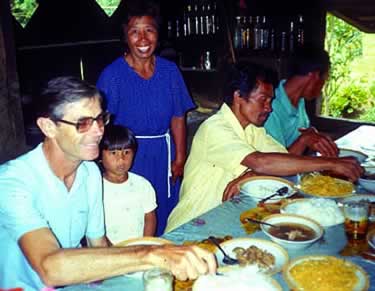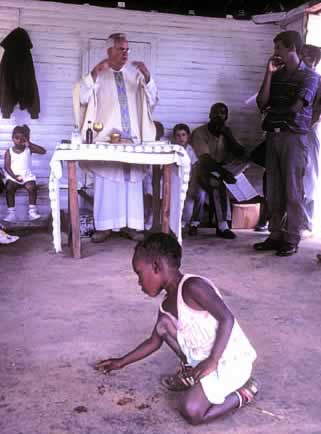Come and Be My Witnesses
Serving the poor of the world, offering your whole life as witness to Christ, is the ultimate challenge
By Fr. Michael Traher, S.F.M.
January 2004
Return to Table of Contents
Print Article
Ever since high school, my first attraction to becoming a missionary priest was adventure. I felt drawn to the mystery of entering other cultures, meeting new people with different customs and language than my own. I had the desire to serve the poor of the world through the Gospel, to offer my whole life as witness to Christ as a missionary priest. This was the ultimate challenge, truly exciting, beyond me, and I knew I had to try it.
I entered St. Francis Xavier seminary as a priest candidate for Scarboro Missions. Most of the priests guiding me already had missionary experience in Latin America, Asia or the Caribbean. Reflecting a wide variety of characteristics, both rugged and refined, they were also talented and full of practical wisdom. Their stories showed a great affection for the people they served as missionaries. All shared a deep love for Christ and for mission. They were real, priestly, and yes, saintly models whom Christ had clearly transformed to become authentic witnesses for the Reign of God in the world.

Fr. Jim McGuire shares a meal with a family in the Philippines where he served for 32 years.
Today, as I look at some of my experience of priesthood, 10 years of which were spent in the Philippines, I realize how my own transformation in Christ occurred along the way. Entering into another culture was a joyful experience that included a good portion of humility. Learning a new language, adapting to new customs and relating with new friends taught me a lot about myself, about my strengths and weaknesses. My confidence grew because of the love and support of the people with whom I lived and served.
But a deeper dimension lies at the heart of mission. It has to do with growing in intimacy with Christ. I learned to rely on Christ and to open my heart to him whenever I was in need or whenever the Christian communities I accompanied in mission sought his help. Growing in trust and intimacy with Christ sustains me as a missionary.
I have been back in Canada for almost 20 years promoting vocations for Scarboro Missions and assisting in General Council responsibilities. Throughout this time, Christ has continued to transform my life. I explain this process as "growing into God," and continue to invite others to explore the same experience.
At the core of priesthood are some key elements that priest missioners must learn to make our own and to integrate fully into our lives. Each of them is a path to Christ: Prayer, the Eucharist, the People of God, Celibacy, Loneliness, Community and Openness to the new.
Prayer
Although it can be taken for granted, prayer and communion with Christ must be the foundation and compass for a priest's day. In difficult situations, when there were no solutions to serious pastoral concerns affecting the people, such as land issues or violence from a guerrilla war, I found my strength coming from Christ and the example he gave in his life.

Fr. Lou Quinn has been celebrating Eucharist and living the Good News among the people of the Dominican Republic since 1965.
And the little miracles did happen, and we were guided through impossible times. In the intimacy of prayer, Jesus shows me my limitations and where I need to grow; he teaches me to listen to the guidance of his Spirit and not my own. One great lesson I have learned in prayer is to do everything in my day together with Jesus as my companion.
The Eucharist
A source of wonder and awe for me as a priest is the power of the Eucharist to bring together a community to be nourished and sustained in the midst of great hardship and suffering. Whether it is celebrated in a remote mountain chapel, or in a busy market town or city, the Eucharist enables the people to come together and hear again God's Word, share their own word and prayers, and receive the life-giving body and blood of Christ. Then they can go out again as renewed signs to one another of the Reign of God, sustained in hope against all odds.
In some circumstances, the priest missionary is alone celebrating the Eucharist, perhaps living among peoples of other religious traditions, or in circumstances that may not allow a public celebration. Here Christ's presence is felt as friend and shepherd, and the missioner realizes a spiritual connection to the whole people of God. Fed by Christ with food for the journey, the priest is then sent out in confidence to serve in whatever manner the people and events of each day require.
The People of God
"We meet in the people." These were the words of one Filipino bishop when a rebel group asked for his support and cooperation with their struggle to oust the Marcos dictatorship of those days. Implied in the bishop's answer was his conviction that the God of Truth, Justice and Peace is present in the people and not in ideologies, or even theologies for that matter.
A significant realization in the life of the priest missionary is that the people transform us. Living in solidarity with the poor and those on the margins, we experience the witness of their faith as they rely upon God to sustain them daily, through every hardship. We recognize many times over that rather than bringing Christ, we are led to discover Christ alive among the people who know their God is with them.
Celibacy
"Can I be celibate?" The model we look to in answering this question is Christ himself. Was Christ a sexual being? Did he experience friendship, intimacy? Did he have to cope with loneliness and the desire for human affection? The answer to all of the above is "Yes!" Jesus modeled the celibate person as one who was fully, joyfully human. He cherished his mother, relished the companionship of his disciples, needed the loving friendship of Martha, Mary and Lazarus, and continually sought the deepest intimacy with God in whom he was nourished and renewed to continue his mission.
"Can I accept to be celibate for the rest of my life, and happy and fulfilled as a priest missioner?" Certainly, if you are called by Christ to the vocation of priesthood. For people of faith, our happiness is determined in a major way by understanding ourselves and the nature of our vocation. Whatever our vocation, we begin to realize true happiness and fulfillment through our commitment to living out that call with Christ as friend and guide.
Loneliness
While every priest needs and enjoys the company of friends and companions, priests do experience loneliness. In fact, there are times of loneliness in every vocation, including marriage. Loneliness is a normal aspect of life. Truly understood, moments of loneliness are a gift from God calling us into deeper relationship with the Divine heart. Only in God do we find our truest fulfillment, a need that no human being can fill. The words of Jesus come to mind: "Anyone who has left houses or brothers or sisters or father or mother or children or fields for my name's sake will receive a hundredfold..." (Matthew 19:29)
Community
When I arrived in the Philippines only a few years ordained, there were six Scarboro priests assigned to parishes along the Pacific coast of Southern Leyte. Not far from the others by motorbike or jeep, I found that getting together with my Scarboro community refreshed and renewed me. When we gathered for meetings, there were times when we shared strong opinions and differing views on circumstances related to our mission there. But when the meeting was over and we ate and socialized together, you would never know that this happy, joking group were the same people in that earlier heated discussion.
Also missioned with us in our area of the Philippines was a small community of Canadian Sisters. We were good friends and grew to be mutually supportive of each other in our various ministries. We became an extended community. Christ was central to our relationship, experienced in special times of prayer and our weekly celebration of Eucharist together, usually followed by a meal and social time. During our gatherings, we shared the joys and challenges of our lived experience among the people struggling with many challenges in that Pacific area. Our shared faith, friendship and community still bonds us today wherever we are in the world.
"SERVING THE REIGN OF GOD REQUIRES A COMMITMENT TO INTERRELIGIOUS DIALOGUE, ECUMENISM, RECONCILIATION, ENCULTURATION, AND JUSTICE AND PEACE. THESE ARE THE NEW FRONTIERS OF MISSION TODAY."
FR. JACK LYNCH, S.F.M.
Openness to the new
From our origins, Scarboro Missions has been in continual transformation. Founded in 1918 as a society of priests, our understanding of mission and ways of living mission have changed significantly over the years.
Since 1975, single and married lay missioners have joined us in serving the Reign of God. This is a new model for mission-ordained and laity serving together. For Scarboro priests, this has meant developing a partnership with laity, a partnership that continues to evolve and deepen.
In many countries where we have served to build up vocations and leadership for the local Church, today local clergy and religious are taking over. Thus our Scarboro priests are free to move on and to serve in new ways. Some of our missioners have developed new skills and are witnessing to the Good News in new and unexpected ways. These include teaching in China where we give witness by our presence, service and friendship; studying Arabic in preparation for Islamic studies; doing interfaith dialogue in Canada and overseas; acquiring expertise in linguistics to assist the survival of indigenous peoples in Brazil.
Scarboro Missions is not a large community. In fact, we are small in number by comparison to other communities like us. Yet, God is clearly doing something wonderful among us.
Challenges ahead
To what other new challenges will God direct us in future? We do not know where the Spirit will lead. But a glance at the daily news reveals a suffering, broken world, stirring our minds and hearts to continue to respond in whatever way God calls us. The needs of the world shout out, and they are the Spirit's voice. God is indeed knocking on the door of the hearts of many young people, some of whom could become the new priests and missioners needed to serve the Reign of God in this new millennium.
Who are these young people? You are joyful, faith-filled persons, full of zeal and ready to commit your lives to bringing about a world of justice, peace and love. God is saying to you, "Come and be my witnesses." The world awaits the healing and liberating love that God delivers through the lives and service of those who will dare to answer this exciting invitation.
Return to Table of Contents
Print Article